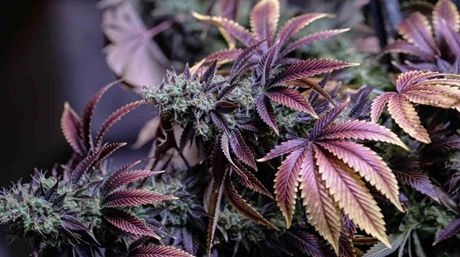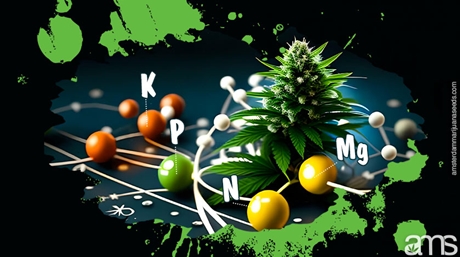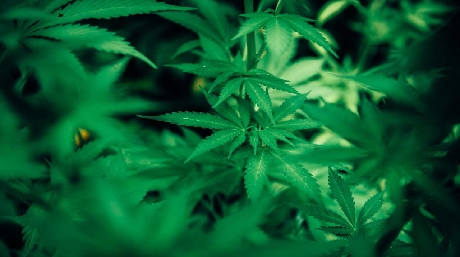Table of Contents
Iron might be considered only a trace of nutrients on the cannabis plants, but its absence can be easily identified due to its impact on the growth and development of the pot plant. Do you know that iron deficiency is the most common type of deficiency that the marijuana plant suffers from? Now you know!
Cannabis plants rely on iron to produce chlorophyll, which makes the plant maintain its green coloring matter. The green color plays a significant role in the absorption of light and carbon dioxide and converts it into food. Chlorophyll also aids in the absorption of nitrogen, which increases the leaves’ growth and development.
The above processes can only run smoothly if there is enough supply of iron throughout the cannabis plant. Lack of iron makes the marijuana plant appear weak and malnourished. This might also lead to stunted growth, reducing the yield of the plant resulting in significant losses.
If the cannabis grower does not take quick action to curb this problem, it might affect the quality of the buds produced. Besides, there are many things that marijuana growers are advised to do to eliminate the issue of iron deficiency in pot plants.
This article discusses multiple solutions and ways of identifying iron deficiency in cannabis plants. Peruse this article for detailed and fruitful information.
Iron Deficiency
For the plants to grow steadily and produce quality yields, they require a good supply of micronutrients in optimal quantities. Iron deficiency in wed plants opens up room for more nutritional conditions that affect the well-being of cannabis plants. Therefore, growers must learn about iron deficiency and know how to solve it.
How To Recognize Iron Deficiency In Weed
The major problem with this condition is that it is hard to identify it clearly from other types of deficiencies. Most cannabis growers tend to mistake between iron and Manganese deficiency. Therefore, it is essential to learn about some of the most common signs of iron deficiency.
Early Signs Of Iron Deficiency In Cannabis
The most common early sign of iron deficiency is chlorosis. This is whereby the younger leaves of the cannabis plants turn pale yellow apart from the veins, which remain green. If it is not treated early, the older leaves at the bottom of the marijuana plants begin turning yellow.
To identify the difference between iron deficiency and other types of deficiencies, you should be in a better position to identify the foliage part that turns yellow. Note that iron deficiency begins by affecting the fresh growing leaves of the pot plant.
Iron deficiency mainly affects the top side of the cannabis plant, where fresh leaves are developing. The other types of deficiencies in pot pants primarily target the middle part or the bottom part of the plant.
Late Signs of Iron Deficiency In Cannabis
When this condition persists, the pale yellow color will turn bright yellow and spread throughout the entire plant. The only advantage is that iron deficiency spreads at a prolonged rate compared to other types of deficiencies.
This means that the cannabis grower has enough time to solve the problem before spreading to the entire plant. But, unfortunately, this will continue, and every newly developed leaf will turn yellow, thus affecting chlorophyll production, which affects the production of food for the plant.
an>At this point, the discolored leaves might drop, marking the end of growth for the entire plant. This is then counted as a loss since the marijuana grower won’t be able to acquire any benefits from the dead cannabis plants.
Causes Of Iron Deficiency In Weed Plants
To be in a better position to treat iron deficiency in plants, you should begin by identifying the cause of the problem. This will give you better ideas on solving the problem and identifying the possible preventive measures. This article sheds light on some of the possible causes of iron deficiency in weed plants.
Overwatering
Overwatering is associated with numerous deficiency conditions experienced in cannabis plants. Therefore, this is one issue that marijuana growers should monitor closely to ensure that their plants are safer.
When you subject your pot plants to a lot of water, you alter the normal functioning of the root system. For example, when the weed plants are grown in an area with poor drainage, the roots tend to rot, affecting the absorption of essential minerals into the plant tissues.
Availability Of Excessive Amounts Of Other Nutrients
Sometimes you might realize that other minerals are available in plenty, causing the iron lockout. Some of the excessive minerals might include Manganese, calcium, zinc, among others. When these minerals pile up, they block the intake of iron from the growing medium by the roots.
Poor pH Levels
pH levels refer to the acidity and alkalinity of the growing medium. An alkaline or a neutral pH level is the leading cause of iron deficiency in cannabis plants. Do you know what causes this condition? Simple! The application of too much fertilizer is the reason behind this condition.
For the roots of the weed plants to absorb the required amounts of iron nutrients, the pH of the growing medium should range between 6.5 and 6.7. You can perfectly maintain this level when you apply use of a meter.
By maintaining this PH level, your cannabis plants will be more advantageous since they will absorb the required amounts of all other types of nutrients. This makes your marijuana plants grow steadily without any form of health disturbance.
Poor Soil Drainage
Various weed growers like using soil as their growth medium; this is not bad, but it is vital to ensure that the soil is in good condition that will facilitate the growth and development of the weed plant.
Drainage is an important aspect whenever you think about planting anything. If the soil’s drainage is poor, the water will get collected at one point making the soil compact itself and choking the roots of the cannabis plants.
This condition makes it hard for the weed plants to absorb iron naturally available in the soil in small quantities, although enough for the plant’s growth. When you want to plant marijuana in the ground, always avoid clay soil since it has poor drainage.
Note that clay soil tends to hold water, making it a poor growing medium for the growth and development of marijuana plants. Many weed growers prefer the use of potting mix since it has good drainage and high-quality organic elements.
The Use Of Coco Coir
Even though iron deficiency in cannabis plants can occur in any growing medium, it is primarily common in coco coir. This is because this ever increasing medium does not have organic iron, and it naturally has high levels of salt compared to other growing mediums. The salty component drives away the availability of iron in this growing medium.
How To Solve Iron Deficiency In Weed
After identifying the cause of the iron deficiency in your cannabis plants, identifying the possible solution to solve the condition becomes easy. Then, you will be confident enough to revive the life of the dying pot plants. The discussed hacks below, are meant to help marijuana growers solve iron deficiency in their plants.
Spray the Cannabis Plants With Iron Chelate
Iron chelate is meant to help the cannabis plants to regain the lost chlorophyll and revive its initial green color enabling the plant to produce food. However, this is considered a temporary remedy for iron deficiency in pot plants since it can only help the available leaves during spraying.
The only down side of this method of iron deficiency treatment is that it should be repeated every time that the weed plant produces a new leaf. Even though this may sound tedious, it helps restore the cannabis plants from iron deficiency.
Flushing The Weed Plants And Adding The Necessary Nutrients
This method is said to have the ability to restore the life of affected cannabis plants within the shortest time possible. Flushing the plants opens up the plant’s entire root system, making it easy to absorb iron nutrients from the soil.
In the beginning, cannabis growers should begin by flushing the growing medium of the weed plants with water with a pH level of 6. This will clean away any type of excess mineral that might be pilling on the roots of the cannabis plants.
The next step is to water the weed plants with a solution containing balanced levels of all types of nutrients necessary for their growth and development. The plant will begin regaining its initial state after an approximate period of one weak.
To be safe, you should remain vigilant by monitoring the growing medium’s pH level and ensuring it is optimal to favor the growth of the pot plant. Acquire a simple pH meter that will help you in monitoring the progress of your cannabis plants.
Application Of Soil Additives
There are numerous sources of iron you can apply in your growing medium when you are balancing the pH level of your cannabis plants. This means that the grower is responsible for selecting the soil additive that will work best to solve the available problem.
However, you should ensure that you have already flushed the plants and the growing medium. This is because you might apply soil additives, yet the plants’ roots are blocked from absorbing iron nutrients from the soil. Therefore, when you apply additives, you will be doing nothing since the roots cannot absorb the nutrients.
Since there are numerous types of soil additives you can apply, let’s unveil detailed information about every growing additive.
Elemental Sulfur
Even though elemental sulfur takes too long to show results, it is worth helping improve the health of the cannabis plant. Besides, it provides a lasting solution in terms of optimizing the pH level of the growing medium. It also helps in making the necessary nutrients for the development of plants readily available.
To make good use of elemental sulfur and get the best results out of it, dig down the soil six inches deep and apply the additive. This will work well if you do this six months before you plant your marijuana plants. This is also said to be the best prevention measure against iron deficiency in weed plants.
Compost
The application of compost in the cannabis-growing medium lowers the PH level by 0.1 or 0.2. This makes the soil stable and feeds it with the desirable amount of iron necessary for the growth of the cannabis plant.
It also improves the drainage of the growing medium making it able to absorb the necessary nutrients from the soil without any hardship.
Fertilizers
The best way to leverage the soil’s pH level and increase the iron content is to apply nitrogenous fertilizers. The fertilizers that contain high levels of urea or ammonium sulfate works exceptionally when applied in the growing medium of cannabis.
Remember that when you feed the growing medium with too much fertilizer will also result in serious troubles. Therefore, you should only add the recommended amount of fertilizers to be on the safe side.
Generally, the only better way you can apply to rescue the marijuana plants from iron deficiency is by taking the necessary action as fast as possible. Since the iron deficiency spreads slowly throughout the plants, it is vital to take quick action since the affected areas might have been deeply impacted.
Final Thoughts
Cannabis growers are responsible for monitoring the performance of their plants and the status of the nutrients in the growing medium. Therefore, it would be best if you were open-minded and keen observant to identify any change in the development of your marijuana plants. Iron deficiency can be treated and can also be prevented. If you have the potential to avoid it, then you are on the better side.















